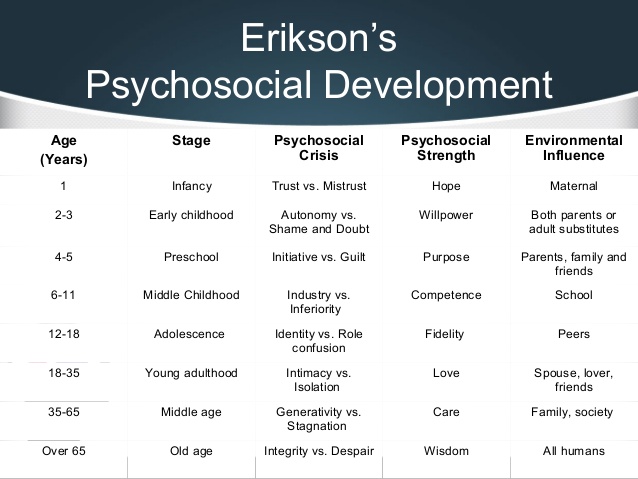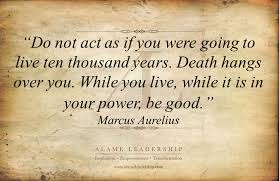This was to be a post on generativity. Defined as a concern for future generations and how we might nurture and guide them, generativity, I read, is one of a few key behaviors leading to a fulfilling and happy older life. Seemed like an interesting topic to pursue, right?
My interest in generativity began while reading “the longest-running study on happiness,” a Harvard University study of 724 white men they’ve been following for 78 years.
It’s a bit of a digression, but if you have an extra 12 minutes, here is the study’s current director, Robert Waldinger, giving a TED talk bringing three of their findings to the public (starting about half way in). In any event, my post continues below.
My research on generativity brought me to Erik Erikson’s eight stages of development. Here’s that dog-eared poster we all had to memorize in Psych 101 class. Remember it?

You’ll see that generativity, for Erikson, is a feature of “Middle Age”– ages 35-65.
“Old age,” you’ll notice, begins for him at age 66! I’d not noticed this before. Of course I hadn’t; I was in “young adulthood” when I last read this. (Erikson’s widow and earlier collaborator, Joan Erikson, added a ninth stage to this original table. Good for her!) That’s when this post took a detour.
An entertaining article in The Huffington Post by Renee Fisher (When Does Old Age Begin?) tells me that when “old age” begins, depends on the age of who’s talking:
For 5-year-olds, old age begins at 13.
For 13-year-olds, old age begins at 30.
For 30-year-olds, old age begins at 50.
For 50-year-olds, old age begins at 75.
For 75-year-olds, never. And go away.
If you’ve been following my blog for awhile, you’ll know I don’t shy from telling people my age, when it’s pertinent. But there are stereotypes assigned to these numbers; so for now, let’s just say I don’t consider myself old, though I aspire to be. Why am I not yet old? That’s easy. There’s still much I want to experience, and to learn. My age, truly, is just a number.
I have good models from which to choose for this.
May Sarton wrote one of her essential-reading memoirs at seventy (not coincidentally entitled At Seventy), which I’m reading this year in eager anticipation. She also wrote At Eighty-two, and Endgame: A Journal of the 79th Year. I’m saving those for later.
And we all know about Grandma Moses, who first picked up a paintbrush at 75. Debra Eve’s periodic blog, LaterBloomer.com, focuses on such “later bloomer” success stories.
But let’s get back to the part of “old age” with which I have trouble. It’s not the label, it’s the assumptions that go with the label.
- Old people stoop.
- Worse, they have various digestive issues, each with its own idiosyncratic sound.
- They idealize the past and generally seem to have lost interest in the future.
- Old people despair of change.
- They move at a snail’s pace.
- Their stories wander off in digressions.
Well, I don’t stoop (do I?). I don’t give off idiosyncratic noises (that I’m aware of). And while I still claim to learn from my past and live in my present, I also have plans for the future. Many, in fact. Besides, I love to rearrange my furniture (much to Woody’s dismay). What better indicator can there be? (Buying hard avocados?)
Slowing down, however, holds great appeal. Particularly as it involves the pace of change around technology. Alvin Toffler (author of Future Shock, how the pace of change would quicken as we moved into the future) only scratched the surface!
You know what I’m talking about: you learn something about Office or Windows or Facebook or some other social media fad and within a month, it’s changed and you must learn it all over again. I may not be as bad as the grandma portrayed in the meme below, but still, I chafe at that.

Yes, slowing down has many advantages and I’m thinking they’ll make a good topic for a future post. I first learned about slowing down during my first yoga class, 37 years ago. My life in general slowed down then and many good things resulted — but that’s for that next book.
Oops, there I go wandering off again. Let’s get back to “old age” and what it means.
Viewing old age as a social construct (an idea created by society) has never been more appealing. Indeed, it is the meaning we assign to this term that holds the power for me.
First a little history.
Western civilization, of which I am a product, has reviled “old age” since the Olympics began in Greece, and Rome didn’t treat old people any better. In Medieval and Renaissance days, old age was seen as weak. Old people in Thomas More’s Utopia conveniently chose to wander off and die. Damn considerate of them, he thought. Maybe he didn’t say damn.
Ageism, unlike its forebears sexism, racism, and classism, is seldom talked about and rarely written about. In fact, a new concept, “successful aging,” currently has more posts in opposition to the term than in support of it. That’s our Western culture for you. If we were in the East — like Kazakhstan where Woody and I lived for two years — to be older is to be sought out, listened to, and valued.
But I’m a product of the West, and focused on finding the positives of, shall we say “growing older.” Here is my incomplete list:
My sense of what’s important has shifted. I care more about other people in general than I once did and less about what they think of me. This is unexpectedly freeing.
My thinking on “knowing” has shifted as well. I once wanted others to consider me the resident expert on something. No longer do I even aspire to “be right.” I find the affirmation, “I’d rather be happy than right” also freeing.
I’m more interested in asking the questions these days than in giving or even getting the answers, in having experiences more than reaching a goal. And I choose the people I hang out with accordingly. What are the questions that intrigue them, the experiences they enjoy?
Perhaps that’s why I love to hang out with the kids at my local elementary school each week, or my grandchildren whenever I can. Kids ask the best questions. They share with me a sense of wonder, of awe in the world around them. Is that at the core of what is meant by generativity? Perhaps. I really don’t know.

I’ll be adding to this list as the months go on. How about you? What can you add?
I’m remembering that old Clairol hair color commercial of decades ago: You’re not getting older, you’re getting better. And then they covered up her grey hair.
How about you? What’s your take on “old age?”
Sigurd Andersen
I like Bill Plotkin’s eight stages
https://www.animas.org/wp-content/uploads/Intro-to-ESDW-for-Animas-website.pdf
and his description of them (in his book Nature & the Human Soul) not as something you get to decide – life tells you – there’s a natural progression. It’s best to live where you find yourself, and not try to force something else.
Sigurd Andersen recently posted…Pathmaking
Janet Givens
Hello Sig and welcome to And So It Goes. It’s nice to have a fellow Returned Peace Corps volunteer stop by. Thanks for the link; I checked it out but found it a bit dense for me on such a bright sunny afternoon. As you said yourself, time to live right where I find myself. Hope you’ll return.
Janet Givens recently posted…How Do We Know What We Know?